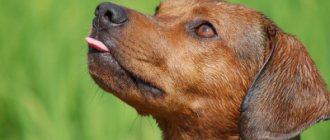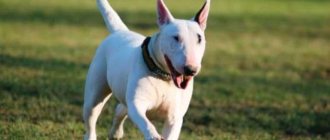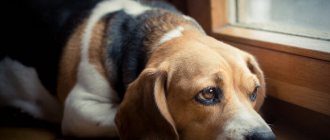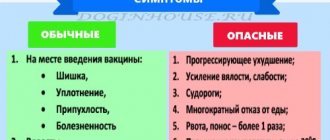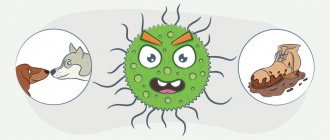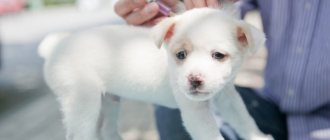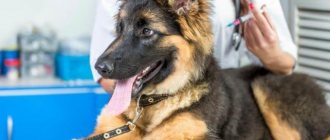Purebred dogs are susceptible to many diseases, which can be avoided by timely vaccination. The process is not complicated, but there are pitfalls.
Vaccination of a dog is carried out with the aim of developing or maintaining the animal’s body resistance to the effects of pathogens of various diseases. Making it is quite simple, you just need to decide on its purpose, choose a vaccine and a good clinic (and sometimes a veterinarian), set a day and get vaccinated.
This is roughly how it all happens, but from the moment of vaccination, the dog needs special attention. It is necessary to create conditions in which she will be least vulnerable to possible complications. Negative consequences may not occur, since the animals’ bodies react differently to the administration of the vaccine. Quite often it is possible to prevent the occurrence of complications, but you need to be prepared for their occurrence.
Photo of a dog at a veterinarian's appointment
Content
1. Variants of side effects: 2. What causes complications? 3. Cases of immediate contact with veterinarians 4. Recommendations for caring for a puppy after injection 5. Conclusion
Vaccinations for puppies are mandatory. Whatever the “yard specialists” say, these injections make it possible to form the correct immunity and develop resistance to serious diseases, such as animal distemper. However, the dog may become ill after vaccination.
It is important to understand that in this situation there is no need to panic, but it is also unacceptable to let the process take its course. Initially, it is worth knowing that with vaccination, virus cells are introduced into the puppy’s body, albeit in a non-functional format. Naturally, the immune system begins an active fight against them. As a result, it weakens and is less resistant to other infections. Therefore, your pet may experience some complications after the injection.
Vaccination schedule
The first vaccination is often given in the nursery at the age of 6 weeks, but it is not mandatory.
The most commonly administered vaccine is against parvovirus enteritis.
Regardless of whether the puppy was vaccinated at 6 weeks or not, at the age of 7–8 weeks they are given a comprehensive vaccination against parainfluenza, plague, adenoviruses (infectious hepatitis and laryngotracheitis), parvovirus enteritis, and leptospirosis. Rarely is this vaccination recommended at an earlier age, for example, if a puppy is born to an unvaccinated mother, during an epidemic, moving to another region or another country, or if the puppy was picked up on the street.
Revaccination is carried out at 12 weeks using a complex vaccine containing the same strains as last time, with the addition of an anti-rabies component.
In some cases (no more than 5%), additional vaccination may be required at 16 weeks using the same complex vaccine as at the age of 7–8 weeks.
The next revaccination is carried out at 12 months and then every year at approximately the same time.
Branches of the Bio-Vet veterinary clinic are located in all districts of Moscow, as well as in Reutov and Lyubertsy. We employ qualified specialists in all veterinary fields. All vaccinations are given with high-quality vaccines, and an official passport is issued for the dog. Trust your pet's health only to professionals!
Side effect options:
| Diarrhea | Loose stools occur quite often. But if you observe this process once or twice, and then everything falls into place, then there is nothing to worry about at all. |
| Vomit | One-off incidents should not cause alarm either. However, there are some pitfalls that are important to keep in mind. In particular, diarrhea and vomiting can cause dehydration, which complicates the situation. This means that after vaccination and in case of vomiting, you should give your pet more fluids. |
| Lost appetite | It happens that a puppy even refuses his favorite food. This is not scary, because after vaccination the body is sluggish and apathetic. Make sure that the so-called hunger strike does not last more than one day, otherwise you need to sound the alarm. |
| Lump at the injection site | It is important to ensure that this seal does not cause pain to the dog or any other discomfort. Sometimes the lump takes quite a long time to resolve – up to a month. |
Features of vaccinations
- Vaccinations can only be given to completely healthy puppies, so a week before vaccination you should carefully monitor their behavior and condition.
- 2-3 weeks before the vaccine is administered, it is necessary to deworm the dog with a drug recommended by the veterinarian. Otherwise, parasites (if any) can negatively affect the formation of the immune response.
- For a week after immunization, it is recommended to observe a quarantine regime: limit the dog’s contact with other animals and strangers, do not overtire it or bathe it, provide adequate nutrition and normal sleep, and do not walk in places where other animals are freely walking.
It is necessary to understand that a vaccine is not a cure; it is not able to help a sick dog, therefore it is necessary to adhere to the recommended vaccination schedule according to age.
What causes complications?
In most cases, dogs tolerate vaccinations quite adequately and normally. For their immune system in particular, and the body as a whole, this is not the most serious stress. However, complications do occur. Their reasons most often are as follows:
- inattention or ignorance of the owners (there is a quarantine regime that must be observed; violations are fraught with serious trouble);
- poor-quality composition of the injection mixture (in particular, expired vaccine, ask your veterinarian about this before the injection, use the services of proven and reliable clinics);
- introducing the composition to an already sick animal (this happens when the veterinarian has not conducted a preliminary examination, or the vaccination is generally done by a person far from veterinary medicine);
- unfortunately, it is rare, but there are cases of individual intolerance to individual components that make up the vaccine.
How to avoid the consequences of injections
To remove the risks after animal injections are completed, it is necessary to entrust the treatment of your pet’s diseases to specialists who know and can perform such manipulations correctly. If you are prescribed a course of injections, then ask the doctor to give you the first injection in your presence. And you pay close attention to the technique of execution, remember the sequence and ask questions about anything that is unclear to you.
Take injections seriously. Carry out all antiseptic measures.
Experience says that owners can give intramuscular or subcutaneous injections to their pet themselves. And if we are talking about intravenous ones, then only a veterinarian is obliged to administer them. There is no need to risk your dog's health, saving your time.
Cases of immediate contact with veterinarians
There are, albeit infrequently, situations when immediate assistance from a veterinarian is required.
| Firstly | Deterioration in health, vomiting and diarrhea for a couple of days, refusal to eat for the same period, high temperature and the appearance of convulsions clearly indicate serious problems and the need to consult a specialist. |
| Secondly | Manifestation of abscess processes in the injection area. The lump increases in size, turns red, and in some cases purulent formations are released from it. Do not try to open the tumor yourself; just like in humans, this is fraught with infection, including blood, with all the ensuing consequences; take your pet to the doctor. In this case, a house call is impractical, since surgical intervention requires sterile clinic conditions. |
| Third | Anaphylactic shock. This is perhaps the most serious and life-threatening condition, when the help of a doctor is required immediately, and we are talking about hours. Allergies are rare, but they do happen, and you need to be prepared for such a turn of events. As a matter of fact, due to possible allergic reactions, it is best to do vaccinations in a clinic under the supervision of a doctor, and not by making a house call, when the injection was given and left. |
What pathologies are manifested by muscle tremors, how to treat them?
There are also not so harmless causes of canine muscle tremors. These include such dangerous diseases as hypoglycemia, hormonal disorders, viral diseases, helminthic infestation, and pathologies of internal organs. If they are present, other symptoms are usually associated. For example, an animal not only shakes, but also feels sick and vomits, it becomes lethargic, breathes heavily, walks poorly, and has difficulty moving its legs.
Hypoglycemia (low blood sugar)
This disease is more common in small breeds, such as Yorkshire terriers. Dogs with low blood sugar constantly tremble, they are lethargic, have a general weakness of the body and low motor activity, often lie motionless or spend most of the day sleeping. If the disease is detected early, it can be successfully cured. In advanced cases, hypoglycemia can cause paralysis of the hind and front legs and even death of the animal.
Food or chemical poisoning
If your pet has frequent muscle cramps and diarrhea, he is constantly vomiting, he is apathetic and walks with his mouth open, experiencing extreme thirst, is weak, does not eat anything, his breathing is impaired, most likely the dog has been poisoned. Treatment of intoxication depends on its etiology, so it is best to entrust it to a veterinarian. After finding out why the four-legged patient was poisoned, the doctor, taking into account the clinical picture, begins detoxification and rehabilitation therapy, which usually includes:
- gastric lavage;
- drip administration of drugs;
- use of antishock, cardiac, antiemetic, diuretic drugs;
- the use of hepatoprotectors, antispasmodics, homeopathic remedies aimed at stimulating the functioning of the liver and digestive organs;
- taking vitamin complexes.
If during a walk or immediately upon returning home, your puppy or adult pet's paw muscles twitch strongly, you should immediately take him to the veterinarian. This condition may indicate that the dog has been poisoned by strychnine.
Hormonal disorders (hypothyroidism, pregnancy, postpartum period)
A lack of thyroid hormones in dogs is accompanied by muscle tremors, weakness and a decrease in body temperature. The main task in this case is to normalize the functioning of the thyroid gland. For this purpose, drugs are used to replenish the deficiency of iodine-containing hormones. With adequate treatment, the first positive changes in the pet’s condition will be noticeable within 7–10 days. We can talk about a complete cure no earlier than after 3 months.
Trembling in pregnant and newly given birth pets can be caused by eclampsia, i.e. a significant decrease in the level of calcium in the body, which leads to disruption of the nervous system. If a bitch, who is expecting the birth of offspring or is feeding her cubs with milk, vomits, while her body temperature rises and her breathing is impaired, she should be urgently taken to the veterinarian.
This condition requires taking measures such as:
- placing the dog in a warm and quiet place;
- giving animals a sedative;
- increasing calcium levels by injecting a solution of calcium chloride or calcium gluconate.
Further treatment should be carried out under the supervision of a veterinarian. Until the new mother fully recovers, the puppies are transferred to artificial feeding.
Viral diseases
Trembling in a pet can be caused by a viral infection (this is especially likely if there are no vaccinations). The most dangerous canine diseases that are caused by viruses are viral hepatitis, distemper, parvovirus enteritis, and encephalomyelitis. Ignoring their symptoms can lead to the death of the animal. The table provides general information about the listed diseases and methods of their treatment:
Recommendations for caring for your puppy after injection
To prevent your dog from getting sick after vaccination, you must follow certain rules:
- Complete quarantine without street walks to prevent any infection. Even a common cold viral infection can have unpredictable consequences.
- In fact, you yourself can become the cause of a third-party infection. For this reason, do not forget about hygiene, clean your house or apartment; wet cleaning, even, if possible, with bleach, is mandatory.
- Do not forget to wash your hands not only after contact with your pet, but also before.
- Try to provide your four-legged friend with complete peace and absence of any forms of stress, in particular, refuse to receive guests.
- You should not experiment with new ingredients in your diet for the first couple of days.
- Completely avoid any water procedures for a week after vaccination.
Which vaccine is best to vaccinate a dog?
Today there are many polyvaccines, both imported and domestically produced. All vaccines have undergone clinical trials and are not particularly different from each other. The use of any of them promotes the development of immunity. But if you are going to travel abroad with your dog, then the requirements of, for example, the European Union for the non-commercial movement of pets limit the list of vaccines used.
If you plan to travel around the world with your dog, then imported polyvalent vaccines such as Nobivak, Eurican, Duramun are recommended.
You can read in more detail about preparing your four-legged dog for vaccination and about the vaccination schedule from birth.
So, you have properly prepared the animal for the procedure and vaccinated it. I have already written that after vaccination the animal’s immunity is very weakened, so the risk of contracting a viral disease is very high. Therefore, after vaccination, quarantine should be strictly observed.

